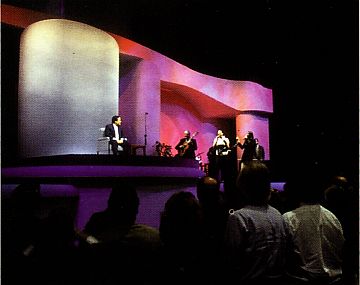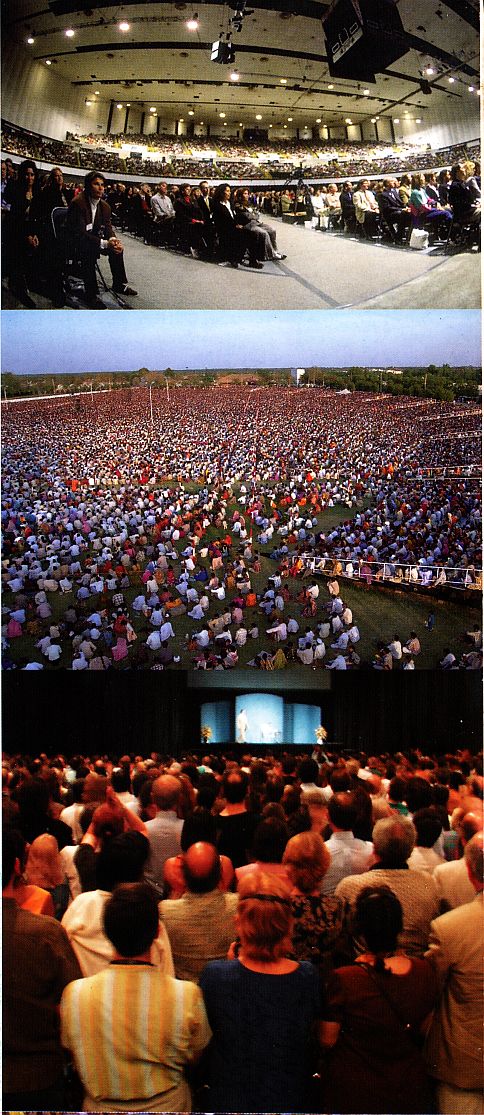
 In any event
In any eventDespite the obstacles, commitment and perseverance win through
A plague of cats, a hurricane, the Tour de France and the British Rail time table: what do they all have in common? The answer is: they have all been threats to events in recent years.
The Palazzo dello Sport, venue for the 1996 anniversary event in Rome, bears more than a passing resemblance to its older, nearby relative, the Colosseum. The fact that they were both built for sporting events, albeit of a slightly different nature, is not the last thing they have in common either.
When set-up staff arrived at the Palazzo they were greeted by large numbers of semi-wild cats, probably relatives of those always encountered by tourists at the ancient stadium. Clearly in permanent residence, it was thought for a while that the pussycats might pose a serious health risk. Fortunately, as more and more people arrived they melted away and were not seen again until after the event had finished, when they returned in force, presumably to resume their own type of propagation.
COUNTDOWN TO AN EVENT
- 60 weeks to go:
View hall and 'pencil-book' it - 32 weeks to go:
National team begin to make plans for possible event - 16 weeks to go:
International schedule confirmed.
Hall is booked for a three-day event.
Event reservations team work with provisional floor plan and begin training programme - 12 weeks to go:
Seating plans finalised.
Contracts for translation and other equipment signed - 8 weeks to go:
Seat reservations open - The event begins:
Seating, set up a reception area and liaise with the ushers to ensure a smooth event
The following month, as the Miami event drew closer, so did a powerful hurricane. It was touch-and-go for several days as Miami residents prepared for the possibility of a total evacuation. Finally the hurricane veered away, leaving Miami calm and ready for the most incredible event yet.
In 1997 an event was scheduled for Paris until it was discovered that the finish of the Tour de France coincided exactly with the start of the event. Right outside the entrance to the venue! Fortunately alternative arrangements were made without a major hitch
The train schedule from busy Sheffield in the north of England nearly disrupted the 1995 event, as the last train to London left before the event started! Happily, the event times were adjusted so that Londoners, and other rail travelers, could make it home.
Every year, all across the world, volunteers work hard through the strangest combination of hours between fax, email and telephone (oh, yes, and occasionally face-to-face too) to ensure the smooth scheduling of events.
Climate, sporting events, political conditions and a hundred and one other factors must be calculated so that events can be staged without guests being inconvenienced.
Venues are often viewed years in advance and reviewed regularly to see if they meet stringent standards. A variety of technical requirements, hotel accommodation for guests, transport, safety considerations, not to mention size and availability, all play a part in whether and when an event can be held in a particular location.
Paul Bloomfield is a lawyer but as well as his "day job" he looks after safety and insurance for national and regional events throughout Europe. He talked a little about the scope of his involvement, which ranges from local video events to major events in India, and we asked: "Why do you do it?"
"It just feels like it is the only place to be really, the feeling is incredible," he says.
The hours Paul puts in may be exceptional but his commitment is typical.

28 Connect 1998


Audiences around the world gather to hear Maharaji speak

Seating at random
It is not by chance that seats are now allocated at random for events. And the volunteers manning the Wembley seat reservation service are delighted that the new system works in a truly random way.
When the reservations-by-phone started several years ago, the operation was manual and the seats were given out on a "first-come-best-seat" basis. This involved lots of stickers and long lists. Things evolved with the computerisation of the process, but it was very difficult to answer the phones efficiently at peak times because the volume of calls was just too great.
The latest developments for 1998 include new measures that take the strain out of this complex and time-consuming task. The vast majority of bookings now come in by fax and some by mail and confirmations are sent out in the same way.
This takes the "telephone tension" out of both sides of the equation.
People making their own reservations no longer have to nurse their telephones for hours, constantly pressing the redial buttons, and those taking the reservations do not have to man the phones for long hours. So as not to lose the personal touch completely, a query line is available in the last couple of weeks before an event and last-minute reservations can also be made by phone.
This new work flow is better for the volunteers as they can plan their shifts around their everyday lives.
The seating team are constantly reviewing and seeking to improve the service. But gone forever are the days of standing in line in the summer sun to get into a hall and then, hopefully, find yourself a seat.
The relatively small planning team, often working months in advance, contrasts with the huge army of people mobilised to put a single event together. Of around 4,300 people attending the Brighton event in 1997, nearly 1,000 helped with set-up and on-the-day operations, reflecting the amount of manpower needed and the enthusiasm that is poured into each event.
Gail Thompson, a working mum of four, is an administrative assistant with the UK seat reservation team. She has undergone extensive training over three years to ensure that the highest level of care goes into the work she does. At event time, she helps out at the "seating" desk in the lobby.
Asked what it takes for her to participate, she replied: "It takes a lot, really. I can't always say immediately if I can come to a shift or a meeting. I have to make sure that Ben, my 10-year-old, is properly cared for first. It's even harder for me to organise helping at the event and at the first event I was involved with I was very nervous. I had to travel to Brighton and stay in a bed and breakfast by myself and I had never done that before."
What then does this level of involvement mean to her: "Well, it's an oasis really. It's my lifeline," she said. "I get so much, anything I can give back I will. I'll carry on right up until it's time for me to go and sit in my seat. I love it. I used to think that it was just a select few who could be involved and that if you weren't asked you couldn't do it. I didn't think you could ask to be involved. And now I just hope I get the opportunity to do it again soon."
There can be frustrations too, as physical circumstances sometimes seem to conspire against the best of efforts. But there always seems to be a solution waiting to be discovered, even if it means ushering 300 people from their allotted seats to new ones in a different part of the hall because the PA system is found to obscure the video screen, as happened in Rome in 1996.
So, blow the winds and confound the cats, somehow the rewards always outweigh the effort. We keep coming back again and again for more and more. And long may it continue.
